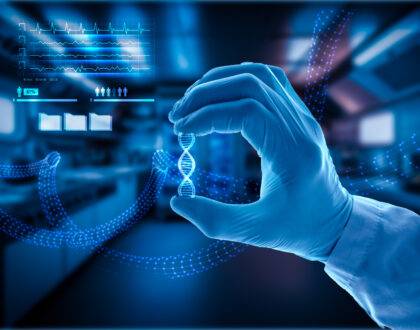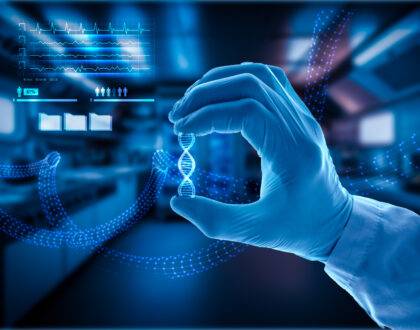The Role of AI in Biotechnology Research

by Web Digital
In the intricate realm of biotechnology research, artificial intelligence (AI) stands as a transformative force, reshaping the landscape of discovery and innovation. This article explores the multifaceted roles of AI in biotechnology, unravelling its potential to accelerate breakthroughs, streamline processes, and unlock new frontiers in scientific exploration.
AI-Powered Drug Discovery: Accelerating Breakthroughs
Target Identification and Validation
AI algorithms analyze vast datasets to identify potential drug targets with unprecedented speed and accuracy. This accelerates the early stages of drug discovery, streamlining the identification and validation of promising biological targets.
Predictive Analytics for Drug Development
AI models leverage predictive analytics to forecast the success of drug candidates. By analyzing molecular structures and biological data, AI enhances the efficiency of drug development, increasing the likelihood of identifying effective compounds.
Precision Medicine: Tailoring Treatments with AI
Genomic Analysis and Personalized Therapies
AI analyzes genomic data to unravel intricate patterns related to diseases and treatment responses. This enables the development of personalized therapies, tailoring medical interventions to an individual’s unique genetic makeup for more effective and targeted treatments.
Biomarker Discovery for Disease Diagnosis
AI-driven algorithms identify relevant biomarkers associated with diseases. This aids in early diagnosis, allowing for timely interventions and a more comprehensive understanding of individualized disease profiles.
Bioprocess Optimization: Streamlining Production
AI in Fermentation and Bioreactor Control
In bioprocessing, AI optimizes fermentation and bioreactor conditions for the production of biological products. This not only enhances yield and efficiency but also reduces production costs and environmental impact.
Real-Time Monitoring and Quality Control
AI enables real-time monitoring of bioproduction processes, ensuring quality control and early detection of deviations. This proactive approach enhances the reliability of biotechnological manufacturing, minimizing waste and ensuring product consistency.
Computational Biology: Unraveling Complex Biological Systems
Protein Folding Prediction
AI algorithms predict protein folding patterns, a fundamental aspect of understanding biological function. This capability contributes to advancements in drug design, disease modelling, and the exploration of novel therapeutic interventions.
Systems Biology Modeling
AI facilitates the modelling of complex biological systems through systems biology approaches. This holistic perspective helps researchers unravel intricate interactions within biological networks, providing a deeper understanding of cellular processes and responses.
AI-Enhanced Imaging and Diagnostics
Medical Imaging Analysis
AI analyzes medical imaging data to assist in disease diagnosis and treatment planning. From radiology to pathology, AI algorithms enhance the accuracy and efficiency of image interpretation, contributing to more precise medical decisions.
Early Disease Detection
Machine learning models process diverse datasets for early disease detection. By identifying subtle patterns in biological markers, AI aids in the early diagnosis of conditions, paving the way for timely interventions and improved patient outcomes.
Challenges and Ethical Considerations
Data Privacy and Security
The integration of AI in biotechnology raises concerns about Data Privacy and Security. Safeguarding sensitive biological and medical data is paramount to maintaining public trust and ensuring ethical research practices.
Bias in AI Algorithms
Ensuring the fairness of AI algorithms is crucial to prevent bias in decision-making processes, especially in areas like genomics and personalized medicine. Addressing biases is essential for equitable and unbiased healthcare outcomes.
Future Trajectories: AI’s Evolution in Biotechnology
AI-Driven Drug Repurposing
The future sees AI playing a pivotal role in drug repurposing, and identifying existing drugs for new therapeutic uses. This approach accelerates the development of treatments by leveraging the vast knowledge encoded in existing pharmaceutical compounds.
Enhanced Collaboration in Scientific Research
AI facilitates collaborative research by integrating insights from diverse datasets and disciplines. The future envisions a connected ecosystem where AI acts as a catalyst for interdisciplinary collaborations, fostering innovation at the intersection of biotechnology and artificial intelligence.
In Conclusion: A Synergy of Innovation
The integration of AI in biotechnology research signifies a new era of innovation and discovery. From drug development to personalized medicine and bioprocessing, AI’s transformative roles are propelling biotechnological advancements at an unprecedented pace. Embrace the synergy of AI and biotechnology, where the convergence of technology and life sciences shapes a future of breakthroughs and improved healthcare outcomes.
Recommended Posts

Quantum Sensors: Revolutionizing Data Collection
November 23, 2023

Biotechnology Breakthroughs: Healing and Beyond
November 6, 2023

The Psychology of Color in Branding
October 31, 2023
